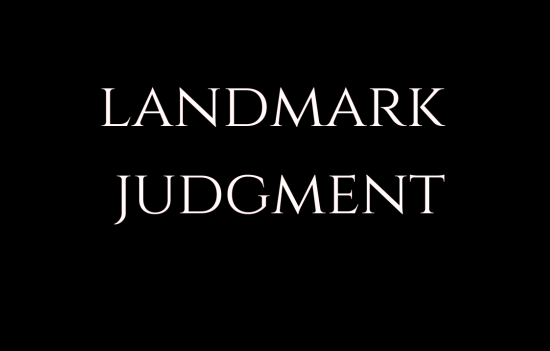CASE BRIEF
UTV Software Communication Ltd. & Ors
Vs
1337x. To. & Ors.
Plaintiff – UTV Software Communication Ltd. & Ors
Respondents – 1337x. To. & Ors.
Decided On: 10.04.2019
Statues Referred-
- Copyright Act, 1957
Cases Referred-
- Eros International Media Ltd. v. Bharat Sanchar Nigam Ltd., Suit No. 751/2016
- Department of Electronics and Information Technology v. Star India Pvt. Ltd., FAO(OS) 57/2015
- Dr. Shashi Tharoor v. Arnab Goswami 2017 SCC OnLine Del 12049
- Cartier International AG v. British Sky Broadcasting Limited [2014] EWHC 3354 (Ch)
- Myspace Inc. v. Super Cassettes Industries Ltd. 2016 SCC OnLine Del 6382
- Shreya Singhal v. Union of India (2015) 5 SCC 1
Facts-
- The Court considered a batch of 8 suits filed by companies engaged in the business of creating content, producing and distributing cinematographic films around the world including India (“Plaintiffs”).
- The Plaintiffs sought injunction restraining the Defendants from infringing the Plaintiff’s copyrighted works in cinematograph films by communicating it to the public without any authorization which were none other than identified websites and also multiple internet service providers.
- The Plaintiffs produced samples of infringing content to support their one-point case that the infringing websites were primarily engaged in hosting pirated content and allowed streaming and downloading of Plaintiffs’ copyrighted works without any authorisation.
- The Court disposed of the matter ex-parte, with only the Plaintiffs present, as the contesting defendants failed to appear on being summoned. Later, an Amicus Curiae was appointed to assist the court.
Issues-
- Whether the act of the defendants of publishing the plaintiff’s copyrighted work on its website without any license or authority would amount to infringement under Section 51 (a) (i) the Copyright Act, 1957?
- How should the Court deal with the hydra headed ‘Rogue Websites’ in their entirely?
Contentions by Parties-
Plaintiff’s Arguments
- The first argument advanced by the Plaintiff stated that the infringing websites named in the present batch of matters allow streaming’ and downloading’ of copyrighted content of the plaintiffs, enabling the users to watch, download as well as share copies of such works.
- The act of Defendant was explained as a commercial model by the Plaintiff as the act of the defendants was generating them revenues by the way of advertisements, which were displayed on the website.
- The Plaintiff contended that the substantial purpose of the defendant-websites is to infringe or facilitate the infringement of copyright of the plaintiffs.
Amicus Curiae’s Arguments
- The first argument of the Amicus Curiae contended that the court should not pass any orders against a website containing legitimate content and thus, the onus was on the plaintiff who was seeking site-wide blocking injunction to produce such evidence before the Court, which confirmed that the website complained of was only operating for sharing / downloading infringing/ pirated content and was not limited to the plaintiffs’ contents but also third parties’ content.
- It was stated that caution had to be undertaken as there could be a website which could have both infringing content of plaintiff and legitimate content of third parties and pointed out that there were about 122 movies of the Plaintiff on the website of the Defendant.
- It was submitted hat the three-step verification test evolved by the Bombay High Court in Eros International Media Vs. BSNL, Suit No. 751 of 2016, which consisted of verification by an independent entity, extensive documents being placed on record and an affidavit on oath, was not satisfied in the present case.
- The counsel further pointed out that if the obligation of an ISP is limited to particular domain names, it would make the whole issue of granting blocking injunctions pointless, since there exists high likelihood of the infringers operating under a different domain name as soon as or even during the time the injunction is granted.
Judgement-
The Delhi Court bench through MANMOHAN SINGH, J, (2011) 47 PTC 1 (Del) held the following:
- The Court concluded that the Defendant Websites were rogue websites.
- The court observed that the act would amount to infringement under section 51(a)(i) of the Copyright Act, if the publication has been made without authorization and in the present case the publication made on the website of the Defendant is made without any licence and authorization and hence was considered in violation of the said provision.
- The Court held that a blocking injunction order against the entire website is permissible however, in doing so, courts must be guided by proportionality. The onus is on the right holders to prove to the Court’s satisfaction that each website which is sought to be blocked is a ‘rogue website’, primarily engaged in facilitating the widespread copyright infringement.
- The Court granted a permanent injunction in favour of the Plaintiff, along with awarding the cost of the litigation.
- The court further recommended that DoT and MeITY should frame a policy to issue warnings to the consumers watching infringing content. In the event that viewers continue to watch the infringing content, then fines may be levied against such viewers.
Rule of Law
The provisions of law which was under scrutiny by the Hon’ble court was with respect to the infringement of the right of copyright under section 51(a)(i).
Conclusion
It can be concluded that this case is best example to understand that for communication of copyrighted work to the public, it is important to have authorization and licence or else such a communication amounts to infringement of copyright.

